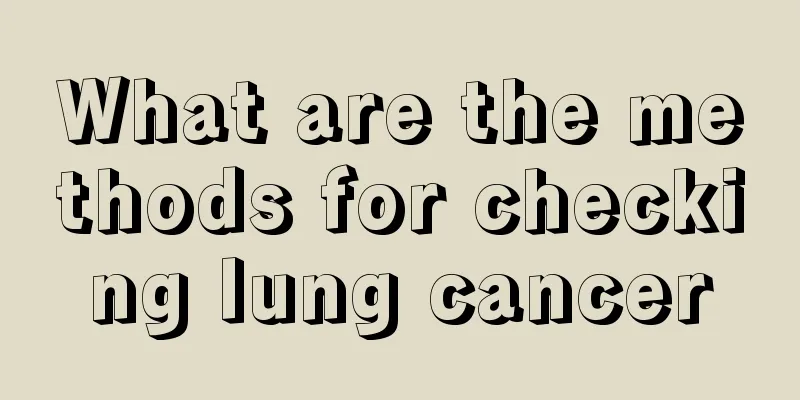What should we do if we are prone to breast cancer? These three groups of people are more likely to develop breast cancer

|
Breast cancer has always been a hot topic, and the proportion of postpartum women suffering from breast cancer is quite large, so which postpartum women are prone to breast cancer? Let's take a look together. 1. Mothers who don't like breastfeeding are prone to breast cancer. The results show that the longer women breastfeed after giving birth, the lower the risk of breast cancer in the future. Research experts pointed out that many women do not continue to breastfeed after their babies are 6 months old. If they can feed for more than 6 months, at least 1,000 people can avoid breast cancer every year. Breastfeeding can promote the regulation of the female endocrine system and gradually restore the balance of sex hormones. Data show that the more times and longer the breastfeeding, the lower the risk of breast cancer. The incidence of breast cancer in women who are not breastfeeding is about 5 times that of breastfeeding women. Experts remind you: Breastfeeding is good for babies and even more beneficial for mothers. People often say that gold, mercury and water are not as good as mother's milk. Indeed, the value of breast milk cannot be replaced by any other food. Breast milk is the first "gold medal" that babies get. First of all, breast milk is rich in nutrients and is the most ideal food for babies. Breast milk contains more fatty acids and lactose, and the calcium-phosphorus ratio is appropriate, which is suitable for the digestion and needs of babies and is not easy to cause allergic reactions. Breast milk is rich in taurine, which is beneficial to the development of infant brain cells and promotes the intellectual development of infants; secondly, breast milk, especially colostrum, contains a variety of substances, which can reduce the incidence of infants in the first year after birth and prevent various infections; breast milk can be fed at any time, which is convenient, hygienic and economical. In addition, breastfeeding can promote the establishment and development of the relationship between infants and mothers, make infants feel satisfied and safe, is an important factor in the normal psychological development of infants, and can better promote the development of infant brains. For mothers, postpartum breastfeeding is conducive to uterine recovery and can reduce the incidence of breast cancer. It is wrong to think that postpartum breastfeeding will affect the body. Breastfeeding is a process that consumes a lot of heat energy and is beneficial for mothers to lose weight. 2. Improper postpartum milking can easily cause breast cancer. The breast is a very delicate place. People who do not understand breast care knowledge and have no formal training, cannot master the weight of the technique, and squeeze the breast with brute force. Violent squeezing not only fails to open the mammary ducts where milk is deposited, but also makes milk deposition more serious, leading to mastitis, and then breast cancer. In addition, for women with nipple fissures, if the masseur is unhygienic, the chance of infection will be greatly increased. Bacteria can enter the breast tissue from the cracked nipple, causing mastitis. Expert Tips: Tips for postpartum mothers to express milk. First, be careful not to hurt the areola and nipple when expressing milk. Squeeze the areola with your thumb and index finger without feeling any pain. Even if the milk is difficult to flow out, do not squeeze it hard. The key to milking is the location and angle of squeezing. Excessive force can hurt the areola. Secondly, the fingers that squeeze the areola should be changed frequently. There are many positions for squeezing the areola. The fingers can be squeezed up and down, left and right, or tilted. If you only squeeze part of the areola, the burden on this part will be too heavy, and there is a risk of injury. Third, try to avoid using a milking machine. The principle of the milking machine is to apply pressure to the surface of the breast through the nipple to make the milk flow out. This is inconsistent with the physiological structure of squeezing the lactiferous sinus to make the milk flow out, and it is easy to damage the nipple. Therefore, it should be noted that the time of using the milking machine should not be too long. 3. Improper breast protection after childbirth can easily lead to breast cancer. No woman does not love her breasts, but some women think that their breasts are not satisfactory, so they artificially suppress or increase them, which is counterproductive. Therefore, if you have a proud chest, don't make the following mistakes. Compressing the chest: Some women feel that their breasts are over-enlarged after giving birth and think that they are not beautiful, so they use bras to compress them, but they don't know that the "compression method" is often counterproductive. Once the "compression" is released, the breasts sag immediately. Artificial filling: As for the artificial method of "fattening" breasts with filling materials, it has a serious impact on health. According to foreign statistics, fillers such as silicone exist in the body for a long time and are likely to induce breast cancer. The editor kindly reminds you that if your breasts are not adapted during pregnancy and lactation, seek medical attention immediately. |
>>: 4 common causes of breast cancer. Eating more of these 3 foods can prevent breast cancer
Recommend
6 signs of nutritional deficiency in the body. How is your body?
Most white-collar workers tend to ignore the impo...
Wisdom teeth hurt when they get angry
In daily life, many people have experienced the g...
What to eat to nourish the stomach after drinking? Fresh mung beans relieve stomach pain
After drinking, people will feel dizzy, have head...
How to clean a new teapot?
Drinking tea has been passed down from ancient ti...
Which fruits are better for the stomach?
The impact of diet on the stomach can be said to ...
Treatment of ascites in patients with liver cancer
If liver cancer is not treated in time, the patie...
The harm of negative ion comb
Negative ion combs are now a must-have item on ma...
Stay away from these three things and you will never get lung cancer
In the terrible kingdom of cancer, lung cancer ha...
What does a light diet mean
With the continuous progress of social life, peop...
Can I have laser surgery for myopia
Nowadays, students will develop myopia at an earl...
What are the causes of increased urine volume?
Urinating is something our bodies have to do and ...
Do you have these main symptoms of chronic laryngitis?
Laryngitis can be acute or chronic. Patients with...
What to do if figs are not ripe
As we all know, ripe figs look purple in appearan...
What are the main causes of hamartoma
In recent years, the number of patients with hama...
Eating pickled vegetables often causes cancer. 8 measures to prevent stomach cancer
Gastric cancer is one of the common malignant tum...









